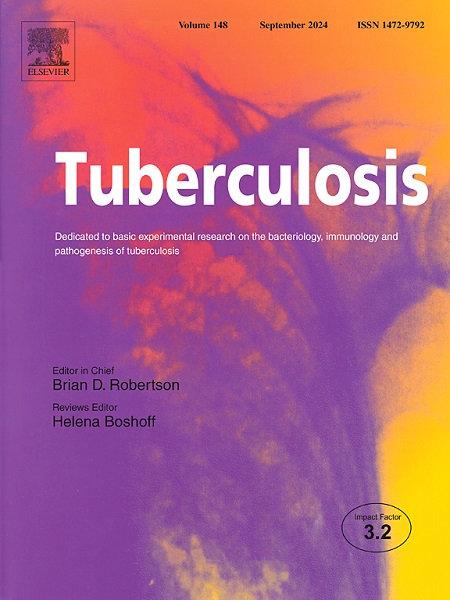Synergistic role of Mycobacterium indicus pranii and human beta Defensin-2 as adjunctive therapy against Mycobacterium tuberculosis
IF 2.9
3区 医学
Q3 IMMUNOLOGY
引用次数: 0
Abstract
Host-directed therapies (HDT) via modulation of specific host responses like inflammation can limit mycobacterial infection. HDTs could be included in current TB therapy as an adjunct to increase bacterial clearance and limit tissue damage to control spread. Individually, Mycobacterium indicus pranii (MIP) and human beta defensin-2 (hBD-2) are promising therapies for tuberculosis (TB). They can directly target the TB bacilli and enhance cell-mediated immune responses, which is limiting with conventional drugs. Therefore, our study investigated the combined application of MIP and hBD-2 to evaluate their efficacy in clearing infections caused by Mycobacterium smegmatis (M.smeg) and Mycobacterium tuberculosis (M.tb) (both avirulent; H37Ra and virulent strain; H37Rv) in THP-1 cells and human monocyte-derived macrophages (MDMs). A strong pro-inflammatory response was observed against the combination of MIP and hBD-2 which also correlated with a significant reduction in the bacterial load. This combination further showed protection against M.tb by enhancing pyroptosis in the infected cells. The study suggests the combined use of these potent immunomodulators, which could be employed as an effective mode of therapy as adjuvants against mycobacterial infections after validation in a suitable animal model.
吲哚分枝杆菌和人类 beta Defensin-2 作为结核分枝杆菌辅助疗法的协同作用。
宿主导向疗法(HDT)通过调节特定的宿主反应(如炎症)可以限制霉菌感染。HDT可作为一种辅助疗法纳入当前的结核病治疗中,以增加细菌清除率并限制组织损伤,从而控制传播。吲哚分枝杆菌(MIP)和人β防御素-2(hBD-2)是治疗结核病(TB)的有前途的单个药物。它们可以直接靶向结核杆菌,增强细胞介导的免疫反应,而这正是传统药物的局限性所在。因此,我们的研究对 MIP 和 hBD-2 的联合应用进行了调查,以评估它们在清除 THP-1 细胞和人类单核巨噬细胞(MDMs)中由烟曲霉分枝杆菌(M.smeg)和结核分枝杆菌(M.tb)(均为无毒株;H37Ra 和毒株;H37Rv)引起的感染方面的功效。针对 MIP 和 hBD-2 的组合观察到了强烈的促炎反应,这也与细菌负荷的显著减少有关。这种组合通过增强受感染细胞的脓毒症,进一步显示出对 M.tb 的保护作用。这项研究表明,在合适的动物模型中进行验证后,这些强效免疫调节剂的联合使用可作为一种有效的治疗模式,作为抗分枝杆菌感染的佐剂。
本文章由计算机程序翻译,如有差异,请以英文原文为准。
求助全文
约1分钟内获得全文
求助全文
来源期刊

Tuberculosis
医学-呼吸系统
CiteScore
4.60
自引率
3.10%
发文量
87
审稿时长
49 days
期刊介绍:
Tuberculosis is a speciality journal focusing on basic experimental research on tuberculosis, notably on bacteriological, immunological and pathogenesis aspects of the disease. The journal publishes original research and reviews on the host response and immunology of tuberculosis and the molecular biology, genetics and physiology of the organism, however discourages submissions with a meta-analytical focus (for example, articles based on searches of published articles in public electronic databases, especially where there is lack of evidence of the personal involvement of authors in the generation of such material). We do not publish Clinical Case-Studies.
Areas on which submissions are welcomed include:
-Clinical TrialsDiagnostics-
Antimicrobial resistance-
Immunology-
Leprosy-
Microbiology, including microbial physiology-
Molecular epidemiology-
Non-tuberculous Mycobacteria-
Pathogenesis-
Pathology-
Vaccine development.
This Journal does not accept case-reports.
The resurgence of interest in tuberculosis has accelerated the pace of relevant research and Tuberculosis has grown with it, as the only journal dedicated to experimental biomedical research in tuberculosis.
 求助内容:
求助内容: 应助结果提醒方式:
应助结果提醒方式:


